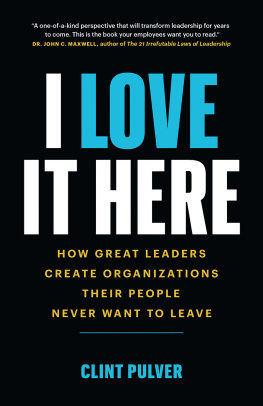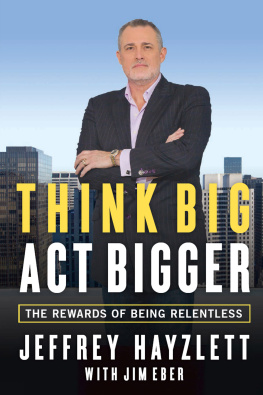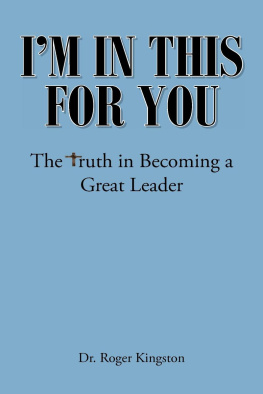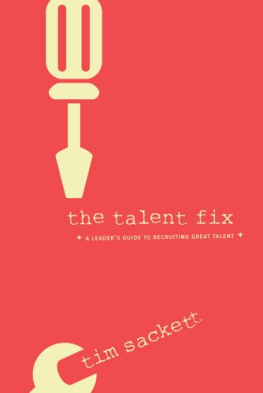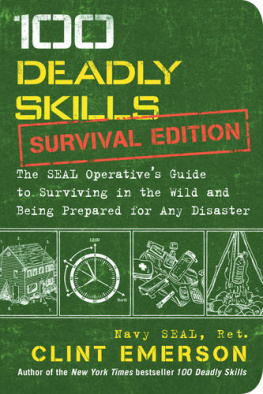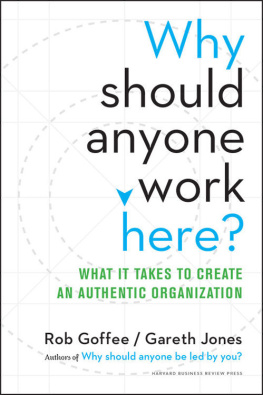Clint Pulver - I love it here : How Great Leaders Create Organizations Their People Never Want to Leave
Here you can read online Clint Pulver - I love it here : How Great Leaders Create Organizations Their People Never Want to Leave full text of the book (entire story) in english for free. Download pdf and epub, get meaning, cover and reviews about this ebook. year: 2021, genre: Business. Description of the work, (preface) as well as reviews are available. Best literature library LitArk.com created for fans of good reading and offers a wide selection of genres:
Romance novel
Science fiction
Adventure
Detective
Science
History
Home and family
Prose
Art
Politics
Computer
Non-fiction
Religion
Business
Children
Humor
Choose a favorite category and find really read worthwhile books. Enjoy immersion in the world of imagination, feel the emotions of the characters or learn something new for yourself, make an fascinating discovery.
- Book:I love it here : How Great Leaders Create Organizations Their People Never Want to Leave
- Author:
- Genre:
- Year:2021
- Rating:5 / 5
- Favourites:Add to favourites
- Your mark:
- 100
- 1
- 2
- 3
- 4
- 5
I love it here : How Great Leaders Create Organizations Their People Never Want to Leave: summary, description and annotation
We offer to read an annotation, description, summary or preface (depends on what the author of the book "I love it here : How Great Leaders Create Organizations Their People Never Want to Leave" wrote himself). If you haven't found the necessary information about the book — write in the comments, we will try to find it.
Clint Pulver: author's other books
Who wrote I love it here : How Great Leaders Create Organizations Their People Never Want to Leave? Find out the surname, the name of the author of the book and a list of all author's works by series.
I love it here : How Great Leaders Create Organizations Their People Never Want to Leave — read online for free the complete book (whole text) full work
Below is the text of the book, divided by pages. System saving the place of the last page read, allows you to conveniently read the book "I love it here : How Great Leaders Create Organizations Their People Never Want to Leave" online for free, without having to search again every time where you left off. Put a bookmark, and you can go to the page where you finished reading at any time.
Font size:
Interval:
Bookmark:
I had opened up Pandoras box. With just one question it all looked suddenly different.
We do not remember days, we remember moments.
Cesare Pavese
A single moment in time can change a persons life. I believe this firmly, just as I believe that its the small and simple moments that compound over time to write our life story. Some of these moments may feel trivial, others leave monumental consequencesboth good and badbut together they are always driving us to our next destination.
It was one of these pivotal moments that led me to create a company and a movement while I was in my twentiesa decision that has allowed me to work with some of the most remarkable organizations and corporations in the world.
In the fall of 2015, I embarked on a five-day business trip with a group of CEO s and other executives to learn from some of the best business leaders in the country. My small troop consisted of nine individuals who had very impressive experience in various industries. Being the youngest in the group, I was passionate, hungry, eager to rub shoulders with amazing leaders, and hopeful that what I learned on this trip would help me grow into someone equally as accomplished and influential.
During this experience, I had the chance to spend time with people like Brandon Steiner of Steiner Sports Memorabilia, a very successful sports marketer and businessman who capitalized on his purchase of the old Yankee Stadium and made part of his fortune by selling bottled dirt and other random Yankee paraphernalia to die-hard fans. We met with a few other business experts as well, and I was fascinated by their stories, their strategies, and the things they had done to make a living and an impact.
On the last day of our trip, we were given the opportunity to interview the CEO of a different major sporting goods enterprise. (Lots of sports meetings happened on this trip.) We were brought to one of his outlets, the flagship of several hundred stores in a chain that had spread across the nation. By the looks of the large, thriving space, there was no end in sight to this CEO s success.
It was absolutely beautiful. The walls were lined with the newest equipment and the racks were full of the latest trends in athletic wear from Nike, Adidas, Under Armour, and more. Everything was neatly hung and smelled of clean rubber. Im not even the biggest sports fan, but as I walked through this palace of athleticism and saw all of the employees cheerfully helping customers, I couldnt help but think that this was a place I would have liked to have worked at when I was younger.
Eventually, our small group found its way to the back of the store, where the CEO was waiting to meet us. He was a fairly tall gentleman, likely in his late fifties. By the way he carried himself and the way he began answering our questions before we had finished asking them, it was obvious he was the one in charge. I was impressed that he would take thirty minutes out of his day to speak with us: he didnt have a clue who we were or what our backgrounds consisted of, nor did he ask.
The CEO s business philosophy was this: You grow, or you die. This seemed fitting for a man who had survived decades of fluctuating economic hardships and shifting business trends. He briefly told us how he got involved with his company, what he loved about it, and how his retail and sales systems had morphed over the years to keep up with the rapidly changing market.
At the end of his talk, the CEO took us on a tour of his storethough simply calling it a store seems insufficient. The space was a wonderland of everything sports-related, and he was the Willy Wonka of it all. The old brick-and-mortar mentality of doing business, where people walk into your store and buy something, is no longer the way its done, he said, gesturing at the impressive assortment of sports gear. Its archaic. You cant run businesses off that model anymore. He paused, turning his gaze toward us. Seventy percent of our sales are online now. Not through the outlets, not even through the stores. Thats the way it is now. Its always changing. You want to survive, you gotta keep up. He raised his hand and made a gesture of emphasis, jabbing the air to punctuate each word: If youre not growing, youre dead.
It was intense, and these startling words seemed to give everyone pause as the CEO went on to talk about the massive shift they had to make toward online sales, what it was like being forced to work through re-sellers like Amazon, and having to run targeted ads on platforms like Instagram and Facebook.
We do a fraction of the old-school marketing that we used to, he said. Everything is digital now, and our ability to stay alive and successful means that weve had to create a whole new model to attract and entice our customers. He turned to face us again, arms folded and face stern. Ill say it again: You want to survive? Then youve got to keep up. Grow or die. Any questions?
I did have questions. As we had been wandering through the store, I was watching all of the CEO s floor staff engaging with customers, selling merchandise, and ringing in purchases, just like retail salespeople have always done. I wanted to know about how all this constant change in the retail model had affected how the business trained and managed its employees. I raised my hand, and he nodded at me.
So, I said. Youve made all these changes to maintain the loyalty of your customers, and it seems to be working out really well. In your experience, have you noticed any differences in your employees and the way they work? Have you also had to change the way you manage employees today, versus the way you had to, say, twenty years ago?
He didnt hesitate for a moment. Nope, he said. The way I managed twenty years ago is the same way I manage today. And you know what? It works! We get results. He smiled and unfolded his arms, sweeping them out to present his beautiful store and colorful merchandise. Look at my success, he seemed to say. Thats all the proof you need.
This response surprised me. I might not have been in the business world for as long as he had, but the dots just didnt connect. This CEO knew he needed to constantly shift his practices to meet the ever-changing needs of the market and his customers, but when it came to his management style, he saw zero need for change.
The conversation moved on as others in the group asked questions like What was your first job? and Who has had the greatest impact on your business career? and How old were you when you became a CEO ? But I was hardly listening. I couldnt get my mind off what he had said about managing his employees. I looked again around the store, paying closer attention to the frontline staff members who were working the floor. Many appeared to be of college age; a few seemed like they were still in high school. Huh, I thought to myself. All millennials, like me. Many even younger.
This was also a time when the overall perception of my generation was perhaps at its worst: many saw millennials as entitled, distracted, unwilling to spend any time in the trenches, free from the expectations and burdens carried by the generations before us.

Source: Pew Research
My generation is older now, and perhaps (I like to think) we are proving our mettle. Today, a scene like the one I observed at that sports store would likely be populated by floor staff from Gen Z (also known as centennials or sometimes zoomers), with a few millennial supervisors in the mix. But I would be thinking the same thing today as I thought back then when that CEO said, Nope. The way I managed twenty years ago is the same way I manage today. And you know what? It works! We get results.
Font size:
Interval:
Bookmark:
Similar books «I love it here : How Great Leaders Create Organizations Their People Never Want to Leave»
Look at similar books to I love it here : How Great Leaders Create Organizations Their People Never Want to Leave. We have selected literature similar in name and meaning in the hope of providing readers with more options to find new, interesting, not yet read works.
Discussion, reviews of the book I love it here : How Great Leaders Create Organizations Their People Never Want to Leave and just readers' own opinions. Leave your comments, write what you think about the work, its meaning or the main characters. Specify what exactly you liked and what you didn't like, and why you think so.

